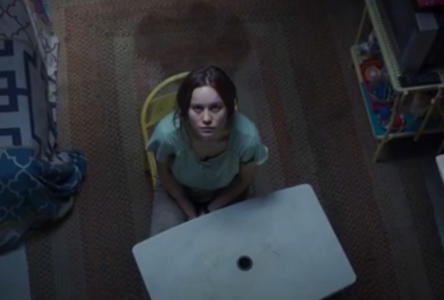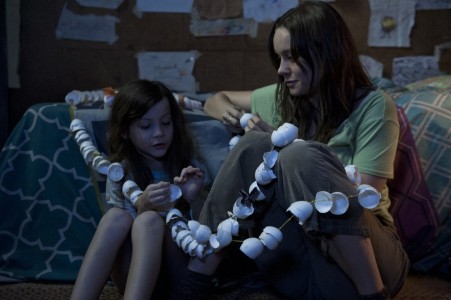Room is a testament to cinema’s power of affectation. Lenny Abrahamson’s adaptation of Emma Donoghue’s award-winning novel is a harrowing and emotionally exhausting experience. Focusing on characters over plot, the bare bones narrative introduces us to five-year-old Jack (Jacob Tremblay) and his mother, whom he only knows as Ma (Brie Larson), held captive in a minuscule shed, after she was kidnapped as a high schooler by Old Nick.
Jacob Tremblay’s infectious enthusiasm in the role, buoyed by one of Brie Larson’s most well rounded characters to date, roots the film in an earthy joy that clings to hope, even if despair and emotional turmoil are constantly threatening to uproot it. The precociousness may wear on some (including myself at times) but rather than settle for an “objective,” realist, or minimalist approach, the film chooses to submerge itself in its subject, interspersing various point of view (POV) shots and by turns, contrasting Jack’s isolated imagination contained in a closeted claustrophobia with a wide-eyed sense of wonder and agoraphobia. Consequently, it tugs on the heartstrings in an openly manipulative way that never assaults its audience with a bleak nihilism, and also avoids veering into maudlin territory.
Brace Yourself
It’s a manic, emotional one-two punch of a film, full of laughter, tears, screaming, tender whispers – all within moments of each other. It’s difficult to adjust and process; just as I settled in to one scene, it’s ripped out from under me and I’m forced to re-establish myself in relation to how the characters respond to their new environment. It may not be a new method to manipulate the audience’s experience to parallel the characters’, but it’s used to great effect. Jack serves as both the subject and object of the film, as Room flits between giving us his perspective and his mother’s. Tremblay shows remarkable promise as a child actor. His precociousness is laid on a little thick and almost dips into parody (several of his voice-overs are guilty in this regard), which will likely cause the more cynical moviegoers to roll their eyes, but it is his naive, childish innocence and ignorance which creates resonance in little moments: his first encounter with a mouse, or later a dog, and his unbridled love for his mother.
Yet even as Room stakes out its ground, the unrelenting need to one-up itself almost causes the film to inwardly collapse. My mind was instantly drawn to Short Term 12, perhaps only due to Brie Larson’s presence, but both films suffer from a heightened emotional style from beginning to end. It’s not only exhausting as a viewer, but in some ways it deflates the power of the film. Without giving space to ponder and process, the film hurtles through its own self-appointed gauntlet. It hits such highs and lows that the artifice of these emotions peeks through. There’s little sense of real tension that lasts, since it never gives us enough breathing room to take in a situation. As soon as one plan to escape is failed another is planned and succeeds within a few minutes. The curious bit is that a different sort of film would have focused on the escape, the tension, suspense, whereas here it has already occurred in fifteen minutes.
The Psychological Aftermath
Room is less interested in the physical tension or suspense; it is rooted in the psychological aftermath. Once they’re free of their makeshift prison, the film makes up for the roller coaster emotion of the first half by taking a slower approach, showing Jack learning about the world; but it doesn’t let up once they’re free – Joy is still mentally captive, bound by manacles of the mind that she can’t quite shake. I began to lose patience with the film at Joy’s suicide attempt. The film overplays its hand, openly acknowledging how invested it is in keeping its audience twisting and turning like a fish on a hook. Sentimentality is not a cinematic sin, but Room is a tale which lays it on so thick it’s hard to breathe through it.



